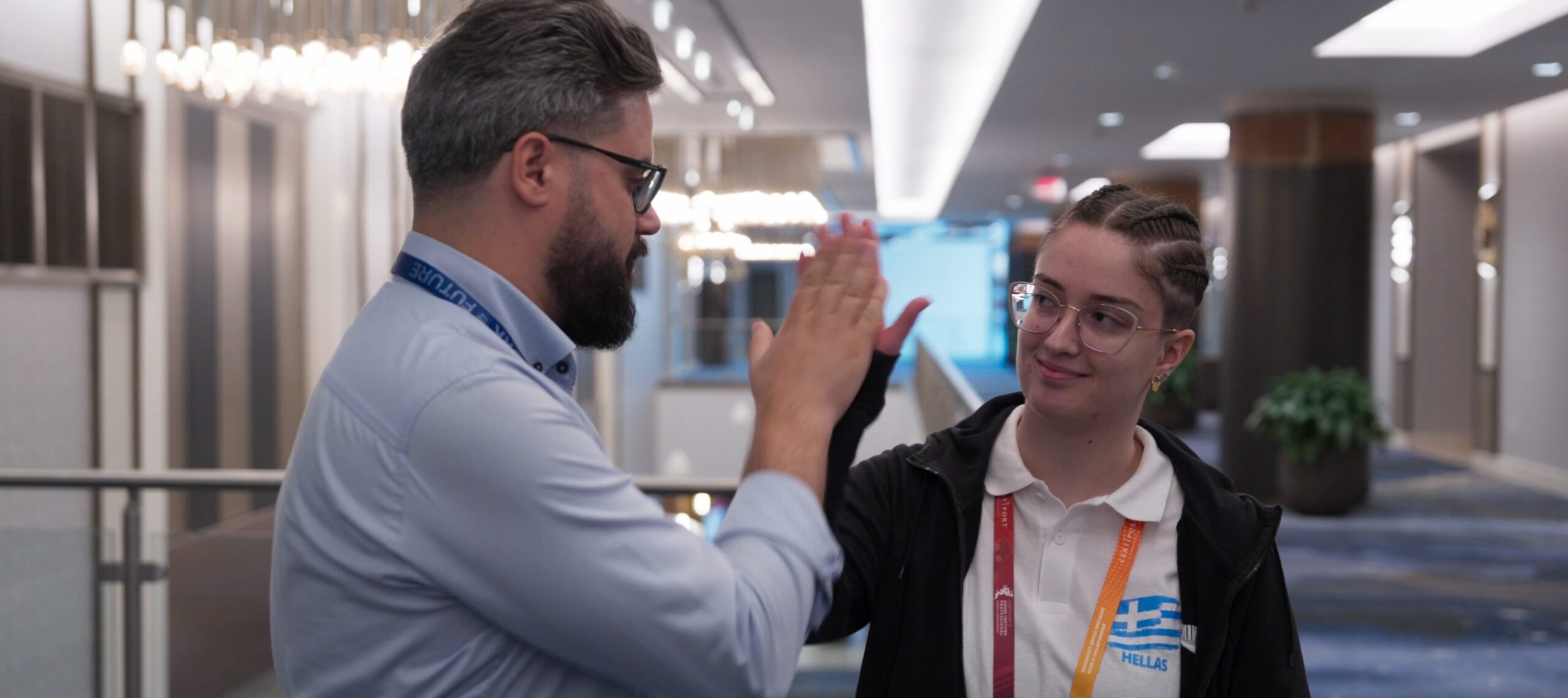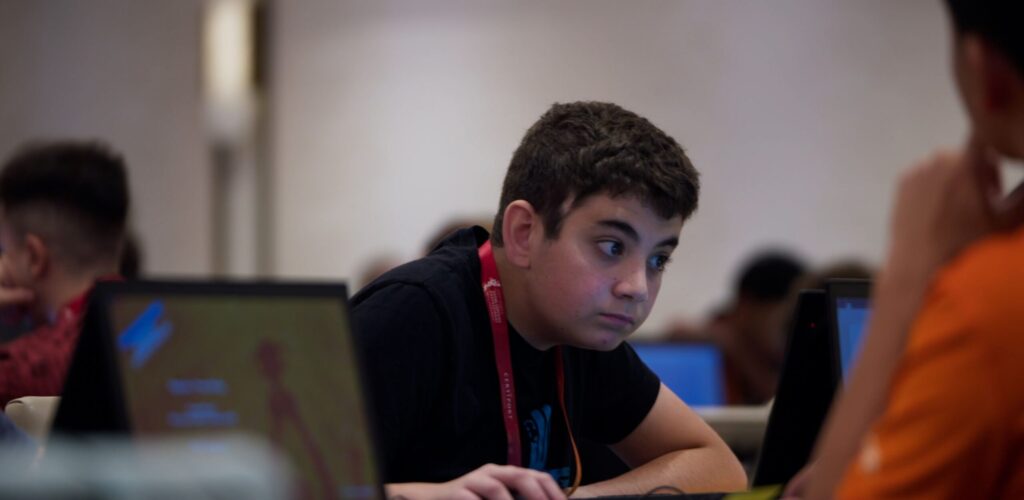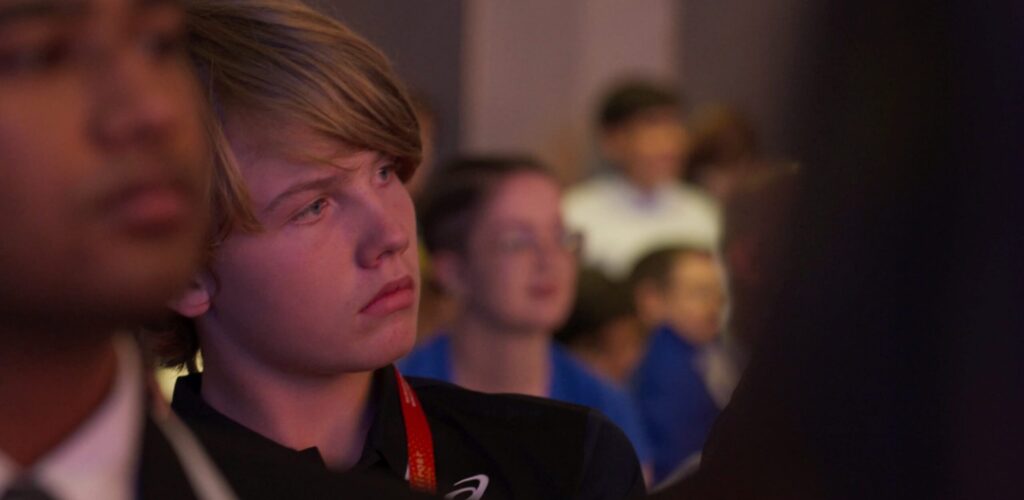Kristina Kraskov’s First Feature Documentary ‘Spreadsheet Champions’ is a Moving Celebration of Nerds Everywhere

Of all the crowds I joined to watch a movie at South by Southwest this year, Kristina Kraskov’s debut feature documentary “Spreadsheet Champions” drew some of the most dramatic reactions from its audience, myself included.
That level of drama is certainly not what you would expect from a film about Microsoft Excel’s World Championship—yes, that is a real thing—where students aged 13 to 22 from around the world compete to test their knowledge of the program.
“Spreadsheet Champions” is a masterclass in storytelling. From the start, Kraskov deeply immerses the audience in the main subjects, six student competitors from around the world, who are each charming, hilarious and massively nerdy in their own way. We hear from their families and teachers and get to see what they love, what they struggle with, and who they hope to become. By the time the champions make it to the actual competition in Florida, I was on the edge of my seat, rooting for every one of them.

“I’ve never been normal. I’m still not normal,” said Mason, 17, one of the students the documentary follows, in an interview with The Independent after the screening. Mason was a clear audience favorite for his hilarious candor and brilliance. “I think when people meet me there’s just a sense of weird they get,” he said. “I think that’s just who I am.”
Mason said that for him, being called a nerd is “a badge of honor.”
Two days after the screening, The Independent’s Hannah Brueske sat down with director Kristina Kraskov to talk about the process of making her first feature-length documentary, her thirst for weird stories, and the messaging of the film.
Hannah Bruske: I am really curious to learn a little bit more about you as a filmmaker. How did you get into making films and breaking into this industry?
Kristina Kraskov: As a kid, I always had a camera in my hand. I used to pretend I was David Attenborough filming my family. I didn’t know what I wanted to study, but then I was like, “Oh, maybe film will be good.” I really liked experimental music videos and really artsy things. After dissecting more into documentary, I realized that was where I wanted to go. It was a lot of people’s second or third options, or something they would do on the side, but I was really, really intrigued by documentary. I made a couple of short films that got into a few festivals and then I just tried to get things funded and pitch ideas. I ended up doing a few short things for Vice […] I didn’t know what my voice would be initially. I wanted to tell stories that people could learn from, but not shove messages down their throats, and also just celebrate people that are unique. Any story that is a bit weird and you go, “Who is that? What is that? That is so strange.” But then, you end up loving and embracing that world and learning something about humanity yourself. That’s what I love and what I keep making films about.”
HB: This film really reflects that whole idea, of exploring something that is so unfamiliar to most people. How did you learn about this story and why was this a story that grabbed your attention and made you want to make a film about it?
KK: I read an article saying, “This kid is the best in Australia at Excel, and he’s going to compete in the world championships.” I’d never heard of any competition like this and I had a million questions. Generally when I learn about a topic and I have a million questions, I do a bit of a deep dive and see if there’s any story there. I really thought there must be a film about this because it is so wild and interesting. From the start it has everything: It has a ticking time bomb competition, it has amazing passionate nerds, it has a global context and technology. And yet, there was no film. So I thought, “Oh, I should make a film,” but I was much less experienced back then. I still reached out trying to get it off the ground…
HB: How did you get the funding for the film?
KK: It was really difficult. In Australia we are very lucky. We have federal and state funding we can get, so we got some initial state funding for development. We were supposed to go and shoot a sizzle [a short promotional video to showcase one’s work] and then COVID canceled that. We got that opportunity a second time in 2022, which was really good. Then we partnered with Good Thing Productions […] they’re kind of the go-to people in Australia. They’ve done so many [features], so they knew a lot more about that world. We had some really good feedback. The Melbourne International Film Festival has a premiere fund, and so a lot of people were interested in the project, but you need to have a lot of ducks in a row and that didn’t quite happen. So actually Anna [Charalambous, producer] and I self-funded the shoot around the world because we didn’t have a lot of time left, and we’d already set everything up thinking we would get the funding and we didn’t. So off we went. Once we had taken the risk already and had the footage, we could get funding from there. So that was good.
HB: That’s cool to hear. Sometimes, you just gotta take the risk and hope for the best. How did you go about actually casting the film?
KK: The casting was really difficult. I think part of the reason we weren’t successful in getting the funding is because everyone wants you to have your cast locked down. But [the students] qualify all around the world, sometimes only a few months before the actual competition. So we just started interviewing everyone that had qualified, trying to get really different personalities, really different geographical locations, different values. And I think they all have really different strengths and weaknesses. You couldn’t compare two of them, which was great.
HB: When you deal with younger subjects, you have to deal with parents. How did you go about gaining their trust and making people interested in wanting to be part of this?
KK: I think some parents were a little bit unsure because it’s a bit of a scary thing to have strangers come from halfway around the world in your house with a camera and ask a lot of questions. But, we were just really honest and upfront. I just talked about my other work. I also did a thesis for my masters on documentary ethics, so I just tried to say that treating subjects correctly and fairly and honestly was really important to me. Then, they agreed. When we got there we were only a very small crew of two — I shot the film with my camera. I think that helped. It wasn’t an overwhelming team of 20 people moving the couch around and changing everything. We just took it slow and we just told them roughly what would happen and asked them if they were okay with that at every stage. And we ended up becoming really good friends with them […] It was a really good process.
HB: I was really impressed with the storytelling in and of itself because going into it I was like, “Okay, a documentary about Microsoft Excel, I’ll see if I can relate anything to that.”
KK: “I think we knew that the stakes and the drama would be there after enough research and talking to them [the students]. We knew that [winning] meant scholarships and life-changing job offers and things like that. After getting to know them more, I guess you’re looking for that subtext. You always write out how you want the story to go, how you envision it going […] In documentary shoots it never really goes that way, but that’s your backup if it doesn’t. So try to learn as much as you can and plan out how to realize those ideas and then and then you usually get something even better. That’s exactly what happened.

HB: How did you go about making sure that you would be able to capture this audience that has no relation to the story and tell a good story?
KK: There was always a fine balance. We learned very quickly that Excel is some people’s whole lives. It’s a really big part of their personality, and they would want a pretty different film from your average documentary viewer who might just be like, “What is this crazy world?” For me it was always going to be about the human stories and the human impact of this world. Particularly, what does it mean to be so passionate about something that most people don’t care about or know about? I think a lot of big sports, celebrities and musicians get a lot of attention, but there’s people putting in more work with things you’ve never heard of. I think those people are the ones worth worth watching.
HB: Some of those people referred to themselves as a “nerd” in the movie. It was a word that was thrown around a lot […] I felt like the movie was sort of a reclamation of that word because often, it’s thrown at people in a very negative way. What does that word mean to you?
KK: I think it means someone who’s kind of brave and they don’t care about what’s normal. That was me, not with Excel spreadsheets, unfortunately, but I was so passionate about things. As a teenager I didn’t understand why these things weren’t cool when they were so cool to me. I think everyone at some point in their lives has felt like an outsider and has felt misunderstood. So it was about calling out what you might think they are. Mason, on the surface, he’s a big nerd, but then we show you who he really is and he’s amazing.
HB: How do you hope people’s opinion of that word might change after viewing the film?
KK: I hope audiences walk away and they feel accepted and hopeful about the future, but also I hope that they’re more open to different people or things they don’t understand, like nerds.
HB: Was South by [Southwest] the first time you watched the film with an actual audience?
KK: Yeah. The first screening was full and that was crazy. It was amazing, because a lot of things we hoped would land people really laughed at. The test was the hardest thing to edit. It was a lot of work and I’d seen it so many times that it got really difficult to know what was working.
HB: That speaks to your great storytelling, though. What has the feedback been so far for you from the audience?
KK: We’ve had a lot of people coming up to us and saying that they loved it, that they felt proud to be a parent, or that someone they knew loved Excel spreadsheets and they had no idea how amazing this world was. The feedback’s been really warm, which is exactly what we wanted. We wanted everyone to feel optimistic and hopeful about everything.
HB: You’ve talked a bit about learning many lessons from the cast. What lesson do you hope that the audience takes from this film?
KK: There’s a couple. I hope that if there’s someone who has different interests or doesn’t quite feel like they fit in […] that they come away feeling seen and valued and that there is a world for them somewhere. I hope people come away being a bit more open-minded about how we stereotype people, like nerds. And mostly, I think the younger generations get a lot of bad press. That’s always been happening since there’s been different generations. But, I did learn so much from these kids. I really do hope people feel optimistic about the future, knowing that these kids are in it. They’re so passionate. I hope [the audience] comes away feeling really good about that too.
The creators are currently waiting for the film to get picked up. The next step for the documentary is entering more film festivals, including screenings at the Melbourne International Film Festival in Australia, Kraskov’s home country, in August.
For more news and updates, people can join the films mailing list at www.spreadsheetchampions.com
